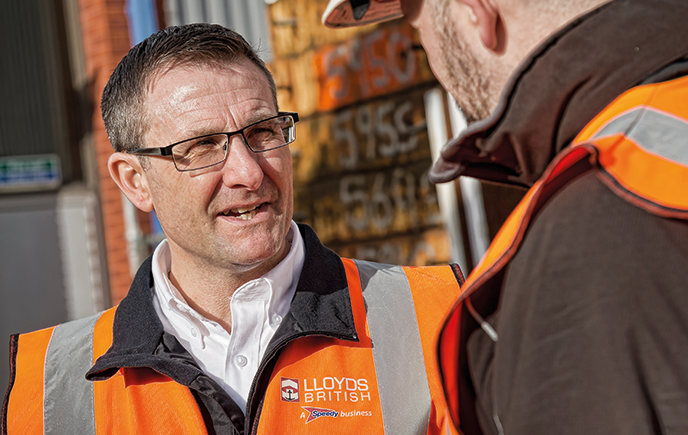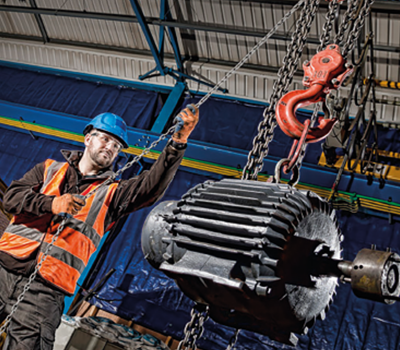Full steam ahead - Scottish distillery with Grundfos
There’s steam and there’s high-quality steam. There are pump solutions and intelligent pump solution...
For all businesses, safety in the workplace should be paramount. But that doesn't simply involve ensuring that the environment is fit for purpose. The equipment specified and used in every workplace is also required, by law, to be thoroughly inspected.

A Lifting Operations and Lifting Equipment Regulations 1998 (LOLER) thorough examination aims to confirm that lifting equipment is safe for continual use and that there are no signs of deterioration that could lead to any kind of failure.
With more than 200 years of specialist testing, inspection, training and certification to their name, Lloyds British are a leading authority in this field, and advise that the deterioration factors leading to equipment failure are wide and varied, including:

LOLER inspections are mandatory, and responsibility is placed on duty holders - or a 'competent person' - to ensure that their on-site equipment undergoes regular and extensive inspection.
A 'competent person' is defined as: "A person that has such appropriate practical and theoretical knowledge and experience of the lifting equipment to be thoroughly examined as will enable them to detect defects or weaknesses, and to assess their importance in relation to the safety and continued use of lifting equipment."
The term 'competent person' doesn't only apply to the engineer carrying out the inspection, but also the company that employs them. There is a legal obligation to ensure that both meet the necessary requirements. Therefore it's advised to employ an Inspection Body holding accreditation to BS ISO 17020.

There are two types of inspections, completed at different phases of equipment lifecycle - Initial Thorough Examinations and In-Service Thorough Examinations.
During Initial Thorough Examinations, lifting equipment must be extensively examined prior to being placed into service. However, there are exemptions, and in cases when your lifting equipment comes with an EC Declaration of Conformity - issued less than 12 months previously - the initial examination is considered satisfactory.
Regulation 9(2) of LOLER explicitly deals with equipment whose safety depends on installation conditions. Any change to the installation, would also require a further thorough examination before it could be put back into service.
Further testing may also be required following the inital inspection to ensure that the equipment in question can sustain the necessary strength and stability for safe working. Before completing any testing, it's also advised to first agree with the manufacturer, to avoid applying forces that the equipment is not designed for.
While some equipment only poses trivial risks when failure occurs, most lifting equipmnent failures lead to disastrous outcomes. Therefore, In-Service Thorough Examinations require all lifting equipment that can deteriorate to dangerous situations to be thoroughly examined periodically.
The frequency of in-service examinations varies dependant on the type of equipment, and the level of risk posed to operators and the general public. When deterioration can lead to unsafe conditions:

Or
However, there may be scenarios where the level of risk is so high, that the competent person may suggest more regular examinations.

All lifting equipment, including accessories, should be clearly marked to indicate their 'safe working loads.' And where equipment is used to lift people, the amount of people should also clearly be stated.
Records should also be kept of all thorough examinations undertaken, and where defects are identifed, these should be immediately reported to the persons using the equipment, the company from whom it's been hired, and potentially the relevant HSE authority.
It's vitally important that all equipment is thoroughly examined to harness a safe and productive environment. But before using any lifting equipment, it's always worthwhile checking that it has undergone the relevant testing and certification. Remember, your safety is your employees priority.
If you're unsure of any regulations, contact your local ERIKS Service Centre to speak with one of our knowledgeable team.

The LOLER Regulations came into force in 1998 and were made under the Health and Safety at Work etc. Act 1974 (HAWASA). Applying to ALL situations and premises covered by the HAWASA, and further builds on the requiments of the Provision and Use of Work Equipment Regulations 1998 (PUWER).
While LOLER only applies to lifting equipment, the safety of similar types of equipment can be ensured by implementing the same procedures recommended by the Regulations. Additionally, even though LOLER specifically applied to lifting equipment, you still have responsibility to meet your obligations under PUWER.
Get the latest updates from ERIKS including:
Choose any or all of these via the ERIKS Subscription Centre!
Our Know+How brings together the best of the latest Know+How Hub articles in one easy to digest magazine, covering the following topics:
That's why its the leading magazine for maintenance engineers from ERIKS.
Want Know+How Magazine delivered direct to your door? Visit the ERIKS Subscription Centre to opt-in!
Take a look at our latest updates...
There’s steam and there’s high-quality steam. There are pump solutions and intelligent pump solution...
Looking for a custom Product quote? Need an answer to a Technical question? Looking for Careers/HR support? Want to work with us? Interested in our Digital Trading solutions? Have a finance question? Send us your enquiry and a member of the ERIKS team will be with you quickly.
We strive to deliver exceptional quality service and products. As part of this goal, we encourage customers to submit feedback on their experiences so we can resolve any issues and concerns.
At ERIKS we strive to deliver the best quality service and products. As part of this goal we encourage customers to submit feedback on their experiences so we can resolve any issues and concerns.
Call us: +441215086000
